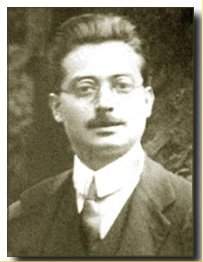Catholic Medical Quarterly Volume 62 (1) February 2012, p7-8
Great Medical Lives;
Saint Joseph Moscati (1880-1927)
Dr Adrian Treloar MRCpsych,FRCP, MRCGP
 “
For I was sick and you visited me" (Mt. 25:46). There can be little doubt Saint
Guiseppe Moscati carried these words daily into his clinical work.
Lifelong works of charity, built virtues in him (and others no doubt) which have
reaped heavenly reward. Saint Guiseppe Moscati (1880-1927) was a physician as
well as a medical school professor. He was canonized in 1987. He was also a
biochemist.
“
For I was sick and you visited me" (Mt. 25:46). There can be little doubt Saint
Guiseppe Moscati carried these words daily into his clinical work.
Lifelong works of charity, built virtues in him (and others no doubt) which have
reaped heavenly reward. Saint Guiseppe Moscati (1880-1927) was a physician as
well as a medical school professor. He was canonized in 1987. He was also a
biochemist.
At his canonization Blessed John Paul II said : "Holiness is man's union with
God in the power of the Paschal Mystery of Christ, in the power of the Spirit of
Truth and Love . . . Love has the power to unite man with God. And this
definitive love matures through the various works of charity that a man performs
in the course of his life."
He was the seventh of nine children born to aristocratic Italian parents. His
father's was a magistrate who would still serve at the altar when they attended
Mass in the chapel of the Poor Clares. When just a teenager, Guiseppe’s older
brother (who was in the artillery) fell from a horse and gave himself permanent
brain damage. Through years of tending his sick brother at home, Giuseppe’s
desire to do medicine grew. So he went to medical school in 1897 at Naples. This
was tricky for a young Catholic as there was open agnosticism and
anti-clericalism at that time. He qualified in 1903. And then went on to work in
the Hospital for Incurables in Naples while also teaching in the university. As
well as a bit of biochemistry he practiced holistically. "Remember," he once
wrote to a young doctor, one of his former students, "that you must treat not
only bodies, but also souls, with counsel that appeals to their minds and hearts
rather than with cold prescriptions to be sent in to the pharmacist."
"Not science, but charity has transformed the world,"
He is quoted as saying that "one must attend first to the salvation of the
soul and only then to that of the body." Through his practice, he helped many
lapsed Catholics to return to the Sacraments. His favorite patients were the
poor, the homeless, the religious and the priests - all from whom he would never
accept payment. He actually went as far as secretly leaving his money within a
patient's prescription or under a patient's pillow. He clearly saw his work as
an apostolate. One day he even refused payment from all his patients saying
"These are working folk. What have we that has not been given us by Our Lord?
Woe to us if we do not make good use of God's gifts!" As Blessed John Paul II
said "In addition to the resources of his acclaimed skill in caring for the sick
he used the warmth of his humanity and the witness of his faith."
When Mount Vesuvius erupted in April 1906, he volunteered to evacuate a
nursing home in the danger zone. He also practised during a cholera epidemic in
1911 and treated about 3,000 soldiers during World War I.
He died after lunch in 1927 having been to Mass and received holy communion
(as he did each day). He was 47. The miracle for his canonization was the
inexplicable cure of a young man who was dying of leukemia. His mother dreamed
of a doctor in a white coat, whom she identified when her pastor showed her a
photo of Blessed Giuseppe. Through his intercession, her son was cured and
returned to his job as an ironworker. The young man, Giuseppe Fusco, attended
the canonization ceremony and presented to the Pope a wrought-iron face of
Christ which he had made. His feast day is November 16.
Reference
- Michael J. Miller. "Joseph Moscati: Saint, doctor, and miracle-worker." Lay Witness (March/April 2004).
